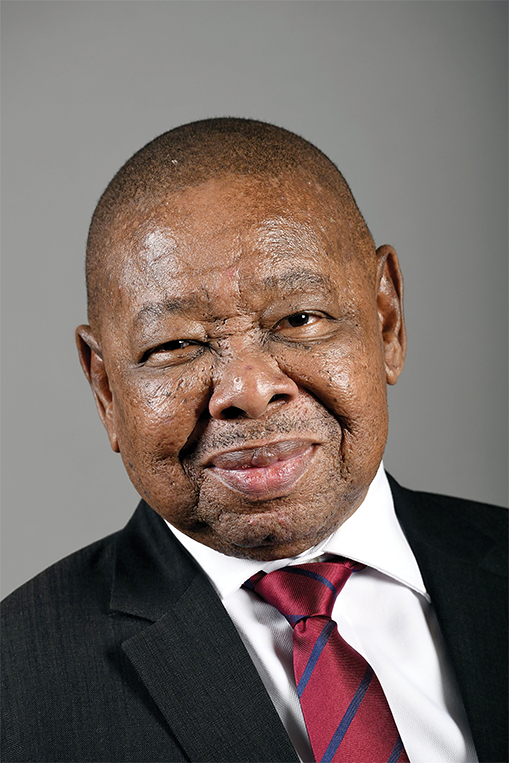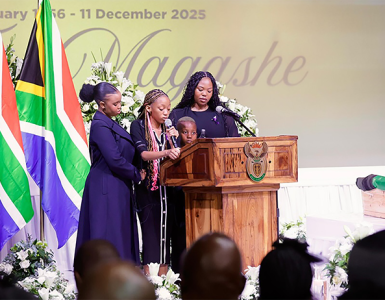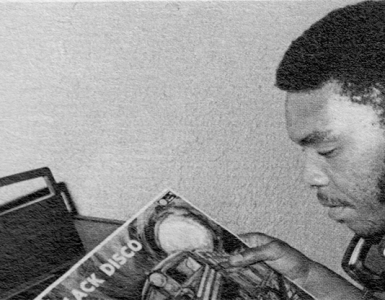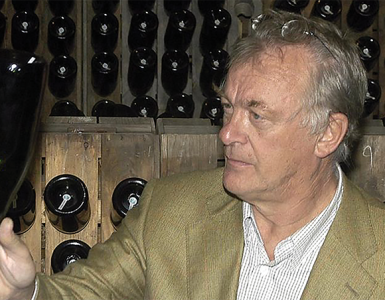TRIBUTE: Science, Technology and Innovation Minister Blade Nzimande describes her as academic visionary who contributed to the training of thousands of young black scientists and researchers…
By Len Maseko
One of South Africa’s top biomedical scientists, Professor Keolebogile Shirley Motaung, who was also research chairperson in entrepreneurship and financial inclusion at Nelson Mandela University, has passed away.

The Eastern Cape university announced her death yesterday, describing her as a distinguished biomedical scientist, entrepreneur and visionary leader whose contributions to science, innovation and women’s empowerment have left an indelible mark on South Africa and beyond”.
Motaung served as chair holder of the Female Academic Leaders Fellowship/Financial Research and Entrepreneurship Foundation – Nelson Mandela University Research Chair in Entrepreneurship and Financial Inclusion, where she led transformative research that bridged innovation, commercialisation and entrepreneurship.
She was also the founder and chief executive officer of Global Health Biotech (Pty) Ltd, best known for developing La-Africa Soother – a plant-based anti-inflammatory ointment derived from indigenous medicinal plants – and a shining example of how scientific discovery can be translated into sustainable, real-world health solutions.
Reacting to the news, Science, Technology and Innovation Minister Blade Nzimande said he was deeply saddened by the news of Motaung’s passing.
“Prof Keo, as she was affectionately known, was one of our country’s most decorated black female scientists and academics. For over two decades, she dedicated her knowledge and skills to the advancement of higher education, scientific knowledge, entrepreneurship, and capacity building,” the Minister said.
With over 26 years of experience in higher education, Motaung dedicated her life to bridging the gap between scientific discovery and societal impact. She was a tireless advocate for women in STEAMI (Science, Technology, Engineering, Arts, Mathematics, and Innovation), mentoring several emerging researchers and entrepreneurs.
Her leadership and influence extended well beyond the academy. She held several prominent national roles, including chairperson of the Organisation for Women in Science for the Developing World (OWSD) South Africa, chairperson of Entrepreneurship Development in Higher Education (EDHE) Community of Practice for Entrepreneurship Research, chair of the National Intellectual Property Management Office’s Advisory Board, and board member of the Technology Innovation Agency.
As a Research Fellow at the School for Data Science and Computational Thinking at Stellenbosch University, she continued to champion interdisciplinary collaboration and data-driven innovation.
“Motaung’s passing is a profound loss to the scientific community, to higher education and to all at Nelson Mandela University who were inspired by her vision, intellect and humanity. Her legacy will continue to inspire generations of researchers, innovators and changemakers committed to advancing inclusive, impactful science,” added the Nelson Mandela University statement.
Nelson Mandela University extended “its heartfelt condolences to her family, colleagues, students and all who were touched by her remarkable life and work”.
In a further tribute to Mofokeng, Nzimande said: “As a scientist, one of her seminal contributions was in the area of stem cells, tissue engineering, and regenerative medicine.
“As an academic visionary, she contributed to the training of thousands of young black scientists and researchers. She was particularly passionate about the development of young black female scientists, researchers, and entrepreneurs,” the Minister said.
He added: “Through this aspect of her work, Prof Motaung made a distinct contribution to our national development goals of job creation for young people and the production of the required number of black female graduates in STEAMI (Science, Technology, Engineering, Arts, Mathematics, and Innovation).
“In Prof Motaung, we also pay tribute to an outstanding leader and patriot, who served our country through a number of national and global institutions such as the Organisation for Women in Science for the Developing World (OWSD), South Africa.
“Owing to her outstanding contribution in the areas of science, higher education, entrepreneurship and leadership, Motaung was also a recipient of a number of prestigious national and international honours such as the Strategic African Women in Leadership (SAWIL) Trailblazers Award, Inventor of the Year Award by Tshwane University of Technology, IPM Business Leader of the Year Award and the Distinguished Woman Scientist Award by the Department of Science, Technology and Innovation,” the Minister said.
Motaung was passionate about science and received international recognition for in the field of scientific exploration into the use of medicinal plants in tissue engineering of bone and cartilage.
Through a company she co-founded, Global Health Biotech (Pty) Ltd, Prof. Motaung developed a natural anti-inflammatory ointment named La-Africa Soother (LAS) from medicinal plants. La-Africa Soother helps relieve muscle and joint aches and provides athletes and women with an alternative natural anti-inflammatory ointment.
For her invention, she tapped into the African knowledge system. Relating her journey of discovery at the time, she said: “I met up with a traditional healer in Limpopo in 2015. She used a confidential blend of herbs and plant species to help people who complained about pain in their joints and knees. She also told me of a man who had broken his hand but had been told by the local hospital to come back after a month to be treated. So he went to the healer.”
When he went back to the hospital, x-rays showed his hand had healed. It seemed that the unique combination of herbs had knitted bone and eased swelling. For Motaung, it was an opportunity to investigate the plants’ properties under rigorous scientific conditions.
“I was sure that these plants had anti-inflammatory properties, and further testing confirmed it.” she said. “I then created an ointment, La-Africa Soother, using these plants. It is an alternative, natural anti-inflammatory ointment.”
The repair of bone and cartilage is a challenging clinical problem. Autografts and allografts are the gold standard for the treatment of bone and cartilage, requiring tissue to be harvested from an alternative site within the patient or from donor tissue. Plant-based morphogenetic factor (PBMF) implants offer orthopaedic patients and patients suffering from osteoarthritis an alternative, less invasive standard.
“South Africa is rich in native flora, which are currently used by traditional healers. These medicinal plants are an integral part of African culture,” says Motaung.
“Currently, the role of medicinal plants in tissue engineering constructs remains unexplored and it is so important that we study this. This will allow us to identify even further alternative treatment opportunities for fracture healing, bone repair, cartilage regeneration and osteoarthritis.”
Thanks to her work with plants and her inventive solutions, she has laid a firm foundation for young scientists to continue where she left off in the future.





























